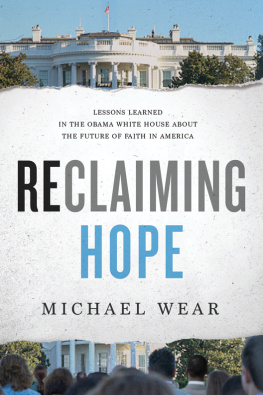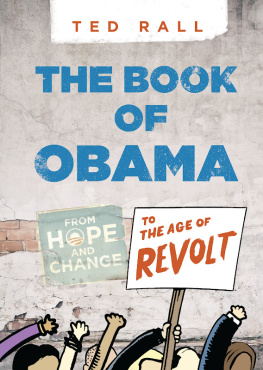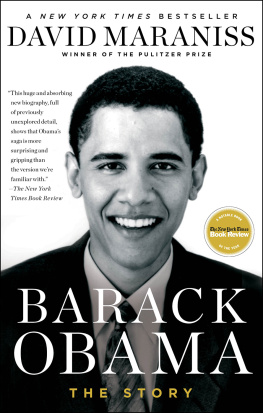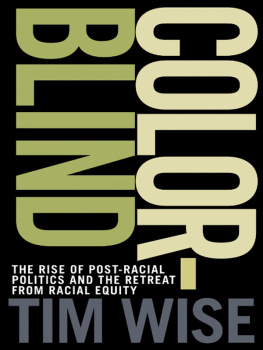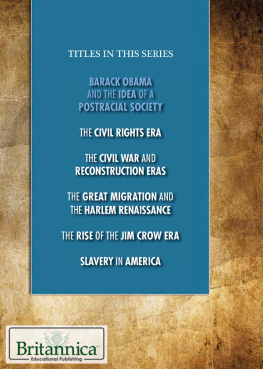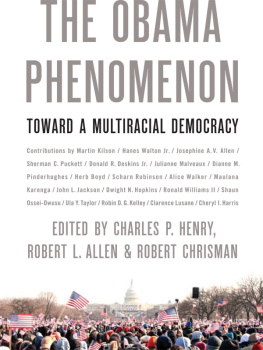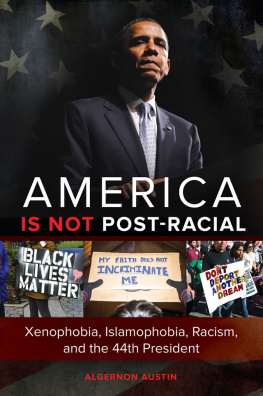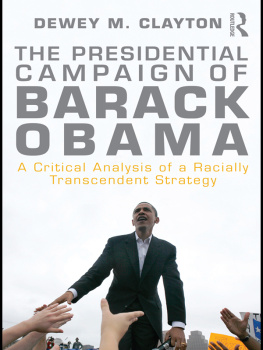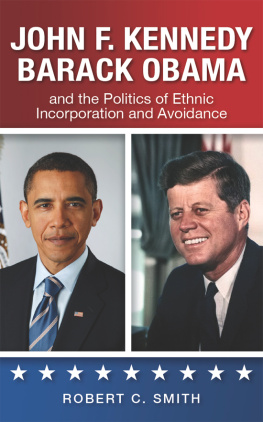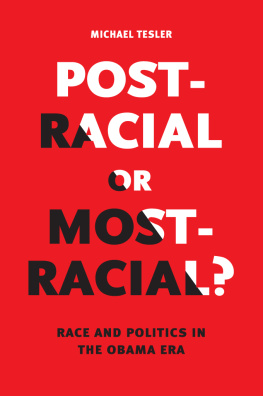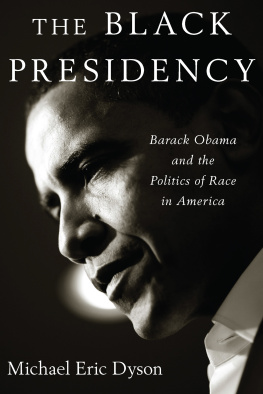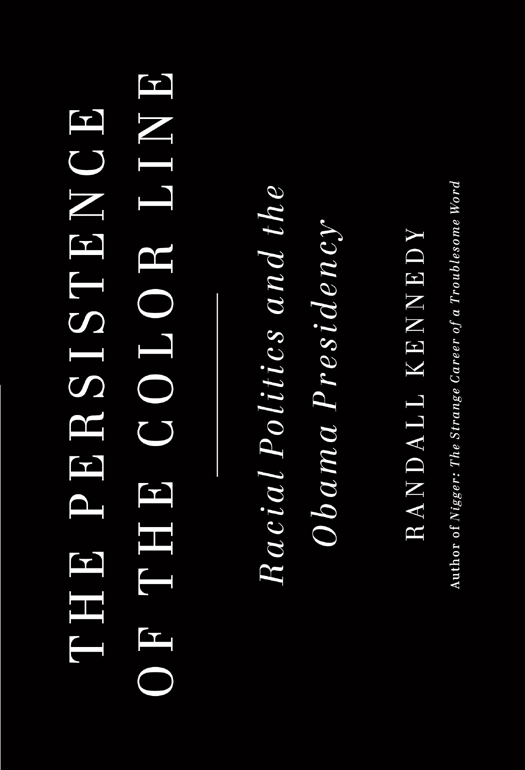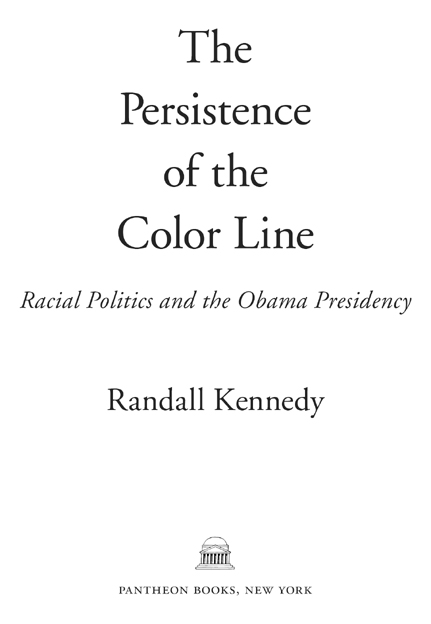ALSO BY RANDALL KENNEDY
Interracial Intimacies:
Sex, Marriage, Identity, and Adoption
Nigger:
The Strange Career of a Troublesome Word
Race, Crime, and the Law
Sellout:
The Politics of Racial Betrayal
Copyright 2011 by Randall Kennedy
All rights reserved. Published in the United States by Pantheon Books,
a division of Random House, Inc., New York, and in Canada by
Random House of Canada Limited, Toronto.
Pantheon Books and colophon are registered trademarks of Random House, Inc.
Library of Congress Cataloging-in-Publication Data
Kennedy, Randall, [date]
The persistence of the color line : racial politics and the Obama presidency /
Randall Kennedy.
p. cm.
eISBN: 978-0-307-37980-1
1. African AmericansPolitics and government. 2. Obama, Barack.
3. PresidentsUnited StatesElection2008. 4. United States President
(2009 : Obama) 5. RacismPolitical aspectsUnited StatesHistory.
6. Race awarenessUnited StatesHistory. 7. United StatesRace relations
Political aspectsHistory. 8. United StatesPolitics and government.
9. United StatesSocial conditions. I. Title.
E 185.615. K 376 2011 973.932092dc22 2010052056
www.pantheonbooks.com
Jacket design by Emily Mahon
v3.1
This book is dedicated to my wonderful children:
Henry William Kennedy
Rachel Elizabeth Love Kennedy
Thaddeus James Kennedy
Contents
Introduction
The terms under which Barack Obama won the presidency, the conditions under which he governs, and the circumstances under which he seeks reelection all display the haunting persistence of the color line. Many prophesied or prayed that his election heralded a postracial America. But everything about Obama is widely, insistently, almost unavoidably interpreted through the prism of racehis appearance (light-skinned), his demeanor (not an angry black man), his diction (articulate, no Negro dialect), his spouse (dark-skinned), the support he enjoys (anchored by blacks), the opposition he encounters (constituted overwhelmingly by whites).
For Obama himself, the consciousness of race is ever-present. It was evident on Election Night when he remarked on the miraculousness of an African American winning the White House. It was evident at the inauguration when he alluded to the fact that, during his fathers lifetime, bigotry denied blacks service in Washington, D.C., restaurants. It was evident at the press conference of December 7, 2010, when, defending hotly disputed tax legislation, he maintained that compromise was central to America, including the Founding Fathers compromise with slaverya bargain that some thoughtful observers have condemned as immoral.
her want to be a better person. A few days later, I received a letter from an inmate of a maximum-security prison in Indiana that said the same thing.
On Election Night one heard repeatedly echoes of Maya Angelous statement I never thought Id see a black president in the White House in my lifetime.
Blacks were not the only ones feeling and expressing pent-up emotion. Responding to a column in which the black journalist Eugene Robinson explained why he wept on Election Night, numbers of white readers noted that they, too, had been moved to tears. In an open Letter to a New Neighbor, Washingtonian Betsy Karasik poured out feelings of gratitude:
In newspapers and Web sites people posted messages by the thousands displaying ways in which Obamas victory deeply moved them. A reader of The Washington Post wrote, We still have a long way to go to erase the sin of slavery and end racism. But maybe, just maybe, this is the beginning of the end of race as a major issue. Today, I can truly say, God Bless America, and mean it.
Euphoric statements made in the grip of the postelection high are painful (and sometimes embarrassing) to recall. Even seasoned observers were swept up by a delusionary millenarianism. Many racial Panglossians, however, have been sobered by realitiesthe substantial number of Americans who simply refuse to acknowledge Obamas political legitimacy (for example, the allegation believed by tens of millions that he was born abroad),
It is, of course, true that there are many potential nonracial reasons for rejecting Obama, including disagreement with his domestic policies (his stance on abortion, financial regulation, immigration, taxation, etc.), foreign policy (his prosecution of the wars in Iraq and Afghanistan, for instance), and also objections to Obama himself. Even some who formerly supported him enthusiastically have subsequently voiced doubts about his mettle as a leader. Against that backdrop, it is wholly implausible to think that racial attitudes would not significantly affect assessments of politicians.
That Obama won the White House in 2008 does not mean that racial prejudice is no longer a potent force in American politics. The political scientists Michael Tesler and David O. Sears argue persuasively that the election of 2008 was anything but post-racial. Instead, the racial hopes and fear evoked by [Obamas] potential to become the countrys first black president sharply divided racial conservatives from racial liberals. Public opinion and voting behavior were considerably more polarized by racial attitudes than at any other time on record. Racial liberals supported Obama more than they would have backed an ideologically similar white candidate while racial conservatives opposed Obama more than they would have opposed an ideologically similar white candidate. Furthermore, there are some who voted for Obama in 2008 despite their disinclination to vote for a black candidate. It should be unsurprising that they would turn against him more quickly and sharply than they would have done under identical circumstances if he were white.
he was simply giving voice to a widespread perception. Obama, moreover, had to overcome the taint of a long association with an Afrocentric spiritual adviser whom the country saw screaming from a pulpit God damn America! He had to overcome fear that the Democrats would once again blow a winnable presidential contestthis time by nominating a candidate who, partly because of his race, would be unable to persuade working-class whites to vote for him. He had to overcome detractors who complained that he is not black enough as well as those who complained that his wife is too black.
That Obama won despite these impediments shows undeniable racial progress. But the presence of these obstacles and the special circumstances under which he prevailed should have counseled caution in interpreting his election as the ultimate racial breakthrough that some saw it as representing. He was helped by the surprising ineptitude of Senator Hillary Clintons campaign; a dramatic economic collapse; two unresolved military conflicts; the evident flaws of his elderly Republican opponent, Senator John McCain; the conspicuous unpreparedness of McCains running mate, Governor Sarah Palin of Alaska; President George Bushs discreditation of Republican competency; and a strong electoral tide in favor of Democrats. Do we honestly believe, one of my students wrote in the wake of the election, that, under normal circumstances, a black person [can] be elected to the highest office in the land, or do we think [that] this was simply an aberration?
Obama did prevail decisively in the Electoral College, winning 365 to 173. He was the first Democrat since Jimmy Carter to win a majority of the popular vote, and his 52 percent take was the largest slice for a Democrat since Lyndon Johnsons landslide in 1964. Obama also captured a larger share of the white vote than either Al Gore or John Kerry had and beat John McCain 54 percent to 44 percent among whites under thirty.


